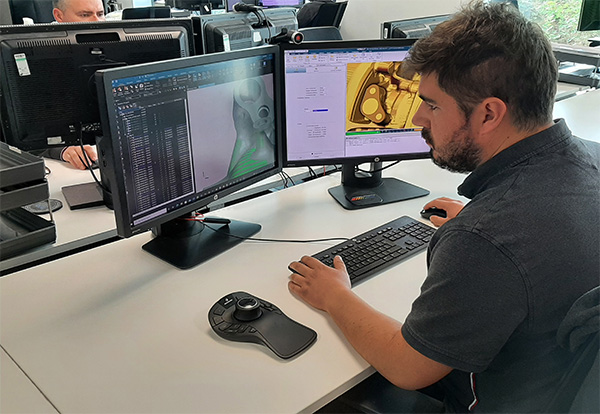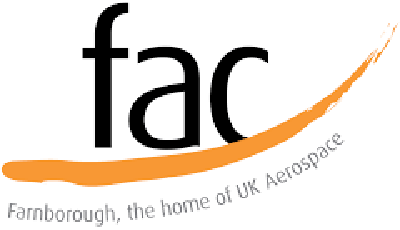VERICUT PROVIDES SAFE AND OPTIMISED MACHINING OPERATIONS FOR THE MERCEDES-AMG PETRONAS FORMULA ONE TEAM
The machine shop of the Mercedes-AMG PETRONAS Formula One Team relies on VERICUT verification, simulation and optimisation software from CGTech to guarantee the successful machining of its many high-complexity, high-value components. A VERICUT user for over two decades, the team has engrained VERICUT into its Standard Operating Procedures (SOPs), aware of the benefits it provides in reducing machine collisions and component scrap, while simultaneously optimising lead time.
Today, the Machine Shop at the Team headquarters in Brackley, Northamptonshire, not only manufactures parts for the race cars, but also for several customer programmes, including other Formula One Teams and the INEOS Britannia Americas Cup sailing Team.
“We are pretty diverse with our component supply, but in all cases reaction time is key: for our race car we sometimes only have 24 hours from design release to delivery,” reveals Machine Shop Manager Robert Brown. “VERICUT really helps as it gives us the confidence to start the machine running safely, enabling us to switch our focus onto another activity, such as writing programs or setting up tools for the next part. This is far preferable to requiring the presence of an operator at the machine, monitoring the cutting process to mitigate the risk of a collision.”
Formula One Teams have been operating within a cost cap for the past couple of years, imposed by the FIA, the sport’s governing body, so the Mercedes-AMG PETRONAS Formula One Team cannot afford to be non-productive.
“Today, more than ever, championships could be won or lost in the factory,” states Mr Brown. “Obviously without the right drivers we’re not going to win, but there’s a reason the sport currently has three dominant teams: because those teams can develop and engineer cars on a scale that no one else can match.”
According to Production Engineer James Peddle, the cost cap has not changed this capability: “Some thought the cost cap would change the order of the grid, but the well-resourced teams with good structures and processes in place have continued to do well. At Mercedes, we’ve got leaner and doubled down on how much value we can extract from our time. As an organisation we are more efficient now than we were two years ago, before the introduction of the cost cap.”
Advanced machine tools
The Mercedes-AMG PETRONAS Formula One Team has 25 machine tools on site at Brackley, including: five-axis machining centres; five-axis turn-mill centres; four and three-axis milling machines; and four and two-axis CNC lathes.
“The enemy of Formula One cars is weight, so approximately 60% of our parts are made from various types of aluminium alloy,” says Mr Brown. “A further 30% are made from titanium, with the remaining 10% comprising steels, other alloys and plastics. Batch sizes of 8-12 are typical for our five-axis machines. Five-axis machining is our speciality and where the team gets its value from this department. We can get high-complexity parts up and running quickly, working closely with the design team to manage any iterations.”
One of the principal challenges is minimising cycle times for these highly complex components without compromising quality. A recent case in point was a titanium front axle.
“The cycle time for this part was in the region of 70 hours over five operations,” says Mr Peddle. “Due to the nature of the material, we were limited by the speed of machining. However, by using the latest machining methodology from one of our suppliers, we managed to reduce the lead time by 50%.”
“We always get really good solid-model transfer from tooling suppliers into VERICUT for our simulations,” he adds. “Whenever we need a bespoke cutting tool, we can do the modifications virtually and seamlessly, and complete the simulation before we place our order for the tool, so we know for certain that it will work.”
Added value
There is little doubting the value that VERICUT adds to operations at the Machine Shop of the Mercedes-AMG PETRONAS Formula One team. Mr Brown was with the company when the software first arrived over 20 years ago.
“Previously we would export CNC code from our CAM system, alongside creating some CNC code conversationally and editing this together into a single CNC program, with all the risks that go with that strategy,” he explains. “We had too many collisions on the machines and too much scrap as a result of human error. But once we had VERICUT, we could export all of our CNC code from CAM and validate it (using VERICUT). The initial investment was all about reducing risk and over the years that thought process has continued. We know that better use of CAM and more use of VERICUT simulations will reduce errors and the risk of machine collisions. If code goes through VERICUT, we know it’s safe.”
Today, tool transfer from the CAM session, through VERICUT and on to a tool sheet is virtually seamless at the Mercedes-AMG PETRONAS Formula One Team. The opportunity for human error, perhaps adding incorrect details or picking the wrong geometry, is significantly reduced.
“It’s always been about reducing scrap and protecting machine tools, which are obviously very expensive assets,” says Mr Brown. “A new spindle is around £20,000 these days. We’ve damaged spindles in years gone by and, when we scrutinised the root cause, it was predominantly human error; someone manually editing a few lines of code incorrectly. Utilising VERICUT to simulate the CAM session has removed human error. Today, every CNC machined component is validated via VERICUT.”
The process
When the Design department at the Mercedes-AMG PETRONAS Formula One team releases a CAD model, the Production Engineering team imports it into a CAM session where various templates exist for the different machine tool types.
“We program within the context of the machine regarding travel limits, access and other parameters,” says Mr Peddle. “Once we’re happy with the program we post-process it and use our CAM-to-VERICUT interface to replicate the set-up we created in the CAM software before running the simulation. We also use VERICUT’s AUTO-DIFF module to check for any excess material or gouging. This is important as we don’t want to reach the end of the program and identify that we’ve missed a section of machining or gouged the part. It would be difficult and increase risk to manufacture some of our parts without AUTO-DIFF, by solely relying on the CAM package.”
He continues: “Another advantage of VERICUT is its simulation speed, which in our experience is far greater than the core CAM product. This ensures a much more efficient and flexible work stream, where we can be programming certain component features while simulating others.”
Around 30 employees at the Mercedes-AMG PETRONAS Formula One Team are trained to use VERICUT, at various levels. Production Engineers might need to create, edit or interrogate sessions, whereas machine operators might only replay the simulation to identify what type of machining operation is coming next in the sequence.
“We operate multiple shift systems around the clock here at Brackley,” says Mr Peddle. “One of the key benefits of VERICUT is its ease of use, especially for staff who work unsupported, outside of regular hours. For example, the night shift might not have the same level of support available as those working shifts that cross our core hours. However, they can just open the software and easily see the entire simulation. They don’t need to be a software expert.”
Regular investment
The machine shop at Brackley replaces most of its machine tools on a 10-year cycle, but investing in a new machine is no problem for VERICUT.
“CGTech has a good library of machine tool templates, so they can usually provide a template ‘off-the-shelf’ or create a bespoke version if required, based upon their extensive library,” explains Mr Peddle. “The support is always excellent, quickly resolving any issues we might have.”
Adds Mr Brown: “CGTech regularly spend time on site with us, periodically though the year, integrating with our CAM team. They understand what we do here and what we need from VERICUT. We have a very strong relationship with them.”
CGTech also has long-standing relationships with all of the major machine tool vendors, a factor that has proved beneficial to the Mercedes-AMG PETRONAS Formula One Team on more than one occasion.
“We’ve recently done a lot of work reducing our five-axis milling cycle times,” says Mr Peddle. “CGTech has a really good relationship with our machine tool suppliers, which meant they were able to gain access to certain machine parameters and build that information into our VERICUT projects, helping us to simulate the digital cycle time compared with the actual cycle time.”
Mr Brown picks up on this important point: “Understanding how much a component has cost to make and what value it has as an asset to the Team has been a complex thing to learn over the past two years since the cost cap was introduced. We’ve had to create a new process where we now rely on VERICUT cycle times to help cost a component. Having really accurate cycle times exported from VERICUT has proved so important.”
Adds Mr Peddle: “As VERICUT has evolved we’ve evolved alongside it, not just in terms of how we prevent collisions, but in reducing lead times and improving quality.”
Another benefit of VERICUT is its independence of the CAM session. The programming stations in the office and on the shop floor at Mercedes-AMG PETRONAS Formula One Team have multiple screens, so users can work on CAM and VERICUT sessions in parallel.
“Due to our compressed manufacturing lead times, we’ll routinely start machining a part before the program is complete, so we can be simulating while we are creating the next sequence of CNC code in the CAM session.” explains Mr Peddle. “We always have a finite amount of time, so we’ll begin roughing as soon as a part is released and get as far as possible before waiting for more code. It’s the only way we can achieve on-time delivery, which translates directly into the machine shop adding performance to the race car.”
Concludes Mr Brown: “Tools such as our CAM system and VERICUT verification, simulation and optimisation software ensure we get the best result possible in the finite amount of time we have.”







